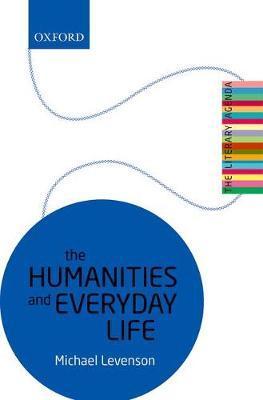Humanities and Everyday Life

Humanities and Everyday Life
claims of cultural history, contextualized explanation, or media studies. It is shaken from without by even greater pressures: by economic exigency and the severe social attitudes that can follow from it; by technological change that may leave the traditional forms of serious human communication
looking merely antiquated. For just these reasons this is the right time for renewal, to start reinvigorated work into the meaning and value of literary reading.
We think of the humanities as a cluster of specialized academic activities. So they are. But they also belong to the ordinary world, the world where students and faculty make connections and careers; where they eat and drink and fret; where they move through new buildings and old seminar rooms. In The Humanities and Everyday Life Michael Levenson places academic humanities within this field of daily life, where abstract thought stands alongside material need. The humanities also live
outside the university in activities that have been overlooked or undervalued: in book clubs, in historical re-enactments, in visits to museums and libraries, in private collections, in contributions to Wikipedia, and in amateur genealogy. These activities belong to the humanities, quite as much as research
published in specialty journals. The Humanities and Everyday Life addresses both the university and the world beyond, to see where they meet and fail to meet, and to argue that the walls between them should lower.
At the centre of the book is an account of experts and expertise, a controversial topic that poses questions about professionals versus amateurs and what constitutes expertise. Drawing on the recent rejection of political elite expertise, as seen in the Brexit referendum and the American election campaign, as well as examples from science and medicin
PRP: 176.62 Lei
Acesta este Pretul Recomandat de Producator. Pretul de vanzare al produsului este afisat mai jos.
158.96Lei
158.96Lei
176.62 LeiLivrare in 2-4 saptamani
Descrierea produsului
claims of cultural history, contextualized explanation, or media studies. It is shaken from without by even greater pressures: by economic exigency and the severe social attitudes that can follow from it; by technological change that may leave the traditional forms of serious human communication
looking merely antiquated. For just these reasons this is the right time for renewal, to start reinvigorated work into the meaning and value of literary reading.
We think of the humanities as a cluster of specialized academic activities. So they are. But they also belong to the ordinary world, the world where students and faculty make connections and careers; where they eat and drink and fret; where they move through new buildings and old seminar rooms. In The Humanities and Everyday Life Michael Levenson places academic humanities within this field of daily life, where abstract thought stands alongside material need. The humanities also live
outside the university in activities that have been overlooked or undervalued: in book clubs, in historical re-enactments, in visits to museums and libraries, in private collections, in contributions to Wikipedia, and in amateur genealogy. These activities belong to the humanities, quite as much as research
published in specialty journals. The Humanities and Everyday Life addresses both the university and the world beyond, to see where they meet and fail to meet, and to argue that the walls between them should lower.
At the centre of the book is an account of experts and expertise, a controversial topic that poses questions about professionals versus amateurs and what constitutes expertise. Drawing on the recent rejection of political elite expertise, as seen in the Brexit referendum and the American election campaign, as well as examples from science and medicin
Detaliile produsului









